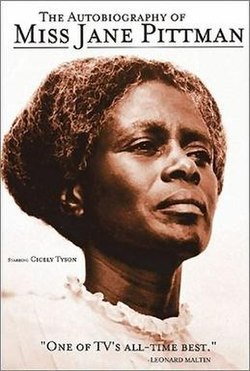| The Autobiography of Miss Jane Pittman | |
|---|---|
 DVD cover | |
| Genre | Drama |
| Based on | The Autobiography of Miss Jane Pittman by Ernest J. Gaines |
| Screenplay by | Tracy Keenan Wynn |
| Directed by | John Korty |
| Starring | Cicely Tyson Barbara Cheney Richard Dysart Katherine Helmond Michael Murphy Odetta Thalmus Rasulala |
| Theme music composer | Fred Karlin |
| Country of origin | United States |
| Original language | English |
| Production | |
| Producers | Robert W. Christiansen Rick Rosenberg Philip Barry Jr. |
| Production locations | Natchez, Mississippi Woodville, Mississippi Ashland-Belle Helene Plantation - State Highway 75, Geismer, Louisiana Ryan Airport - 9430 Jackie Cochran Drive, Baton Rouge, Louisiana The Cottage Plantation - 10528 Cottage Lane, St. Francisville, Louisiana |
| Cinematography | James Crabe |
| Editor | Sidney Levin |
| Running time | 110 minutes |
| Production company | Tomorrow Entertainment |
| Original release | |
| Network | CBS |
| Release | January 31, 1974 |

as Jane Pittman (1974)
The Autobiography of Miss Jane Pittman is an American television film based on the novel of the same name by Ernest J. Gaines starring Cicely Tyson as the titular heroine. The film was broadcast on CBS on Thursday, January 31, 1974. [1] [2] [3]
Contents
Directed by John Korty, the screenplay was written by Tracy Keenan Wynn and executive produced by Roger Gimbel. [4] [5] It stars Cicely Tyson in the lead role, as well as Michael Murphy, Richard Dysart, Katherine Helmond, and Odetta. The film was shot in Baton Rouge, Louisiana, [6] and was notable for its use of very realistic special effects makeup by Stan Winston and Rick Baker for the lead character, who is shown from ages 23 to 110. [7] The film is distributed through Classic Media.